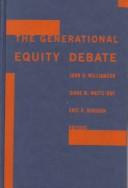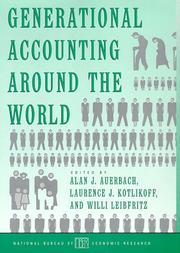| Listing 1 - 4 of 4 |
Sort by
|
Book
Year: 1999 Publisher: Cambridge, Mass. National Bureau of Economic Research
Abstract | Keywords | Export | Availability | Bookmark
 Loading...
Loading...Choose an application
- Reference Manager
- EndNote
- RefWorks (Direct export to RefWorks)
Against a background of projections of sharply increasing elderly dependency rates, workers in the major industrial economies are apprehensive that their social security benefit entitlements will be cut before or after they retire, leaving them with inadequate retirement income. This paper looks at recent benefit rule changes in the G7 countries to see what can be learned about such political risk in PAYG pension systems. From this small sample, I find that projections of rising costs under current rules are inducing reforms, and that these reforms often have a major impact on the present discounted value of promised benefits for middle-aged and younger workers. Usually, however, the benefits of the retired and those nearing retirement are protected. The phasing in of benefit cuts raises the question as to why younger workers are willing to take significant cuts in their implicit wealth while protecting the currently old. One possible answer is explored through a simple model: these workers fear even larger cuts in their benefits if the tax burden on future workers rises too high.
Book
Year: 1999 Publisher: Cambridge, Mass. National Bureau of Economic Research
Abstract | Keywords | Export | Availability | Bookmark
 Loading...
Loading...Choose an application
- Reference Manager
- EndNote
- RefWorks (Direct export to RefWorks)
Are market and voting institutions capable of producing optimal intergenerational risk-sharing? To study this question, we consider a simple endowment economy with uncertainty and overlapping generations. Endowments are stochastic; thus it is possible to increase the welfare of every generation using intergenerational transfers that might depend on the state of the world. We characterize the transfers that are necessary to restore efficiency and compare them to the transfers that take place in markets and voting institutions. Unlike most of that literature, we study both ex-ante and interim risk-sharing. Our main conclusion is that both types of institutions have serious problems. Markets cannot generate ex-ante risk-sharing because agents can trade only after they are born. Furthermore, markets generate interim efficient insurance in some but not all economies because they cannot generate forward (old to young) intergenerational transfers. This market failure, in theory, could be corrected by government intervention. However, as long as government policy is determined by voting, intergenerational transfers might by driven more by redistributive politics than by risk sharing considerations. Successful government intervention can arise, even though agents can only vote after they are born, but only if the young determine policy in every election.

ISBN: 0231112858 9780231112857 Year: 1999 Publisher: New York: Columbia university press,
Abstract | Keywords | Export | Availability | Bookmark
 Loading...
Loading...Choose an application
- Reference Manager
- EndNote
- RefWorks (Direct export to RefWorks)

ISBN: 0226032132 9786611223076 1281223077 0226032183 9780226032184 9780226032139 9780226032184 9781281223074 661122307X Year: 1999 Publisher: Chicago University of Chicago Press
Abstract | Keywords | Export | Availability | Bookmark
 Loading...
Loading...Choose an application
- Reference Manager
- EndNote
- RefWorks (Direct export to RefWorks)
The realities of mounting government debt, tax burdens, and an aging population raise serious concerns about the financial legacy confronting future generations. How great a fiscal burden will current policies leave to subsequent generations, and how might changes in those policies alter the intergenerational distribution of public welfare? Generational accounting has recently emerged as a robust new method of fiscal analysis and planning designed to assess the long-term sustainability of fiscal policy and to measure the extent of the financial load ultimately borne by present and future generations. A seminal contribution to public economics, generational accounting has already been adopted by 23 nations around the world. Combining the latest and most extensive country-by-country generational analyses with a comprehensive review of generational accounting's innovative methodology, these papers are a consummate resource for economists, political scientists, and policy makers concerned with fiscal health and responsibility.
Generational accounting --- Bejaardenproblematiek 312-053.8 --- Sociale zekerheid 368.4 --- #SBIB:33H16 --- #SBIB:35H435 --- #SBIB:35H437 --- AA / International- internationaal --- 305.93 --- 336.61 --- 311.94 --- 339.5 --- Generational accounts --- Finance, Public --- Publieke financiën --- Beleidssectoren: economisch en werkgelegenheidsbeleid --- Beleidssectoren: sociale zekerheid --- Econometrie van het gedrag van de overheid, van de uitgaven en ontvangsten van de overheid, van de begroting. Econometrie van de belastingen. --- Financieel beleid. --- Verdeling van de bevolking naar leeftijd. Veroudering van de bevolking. --- Accounting --- Generational accounting. --- Accounting. --- Government accounting --- Governmental accounting --- Public accounting --- Econometrie van het gedrag van de overheid, van de uitgaven en ontvangsten van de overheid, van de begroting. Econometrie van de belastingen --- Verdeling van de bevolking naar leeftijd. Veroudering van de bevolking --- Financieel beleid --- accountant, finance, financial, money, wealth, income, economy, economics, career, worldwide, international, global, debt, government, tax, taxes, population, aging, growing old, legacy, future, generations, fiscal, policies, welfare, intergenerational, millennial, gen z, analysis, planning, savings, sustainability, academic, scholarly, research, higher ed, college, university, textbook.
| Listing 1 - 4 of 4 |
Sort by
|

 Search
Search Feedback
Feedback About UniCat
About UniCat  Help
Help News
News